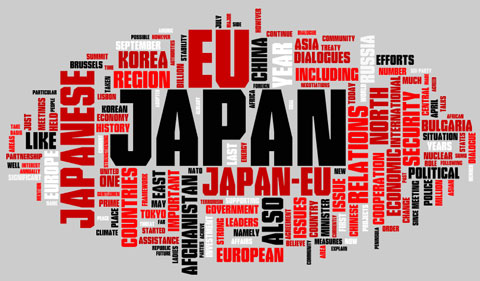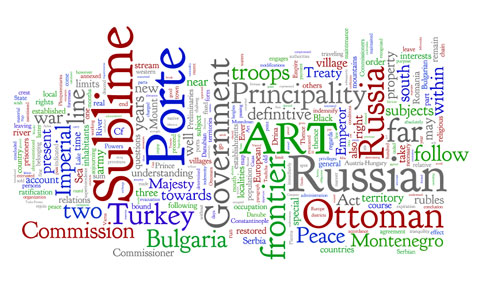Word cloud of a speech by H.E. Takekazu Kawamura, Ambassador of Japan to the European Union, delivered at the Bulgarian Diplomatic Institute in Sofia, Bulgaria on 12 June 2008.
Full text of the speech follows the world cloud.

“Japan and the EU: Valuable Partnership for the Future”
His Excellencies, Professor Milanov, ladies and gentlemen,
Thank you very much for your kind introduction.
I would like to say what a great pleasure and honour it is for me to be invited here today. I would like to express my sincere gratitude to Professor and Ambassador Milanov, Director of the Diplomatic Institute of the Ministry of Foreign Affairs of Bulgaria and his staff, for making this event possible.
As Ambassador of Japan to the EU, I will speak today primarily on Japan-EU relations. As this topic can be quite broad, I will divide it into three parts: a brief history of Japan-EU relations, current Japan-EU political dialogues, in particular in relation to East Asia, and overall relations, and Japan-EU partnership in the future.
But before I begin, let me take this opportunity to express my respect for your country’s efforts since 1989 in democratisation and the shift to a market economy. Bulgaria was the first of the former Eastern Bloc countries to adopt a democratic constitution in July 1991 and joined the EU in January 2007. I understand that currently, Bulgaria is taking various measures with the goal of implementing Schengen possibly in 2011, and the eventual adoption of the Euro. It will be important that these and other various reforms are continued to ensure you follow the path you have taken. I would like to wish you every success in your efforts.
As some of you may be aware, there is a very popular and successful sumo wrestler from Bulgaria, whose professional name is “Koto-oushu.” “Koto” is a traditional Japanese stringed instrument, and “oushu” means “Europe” in Japanese. Last month Kaloyan Stefanov Mahlyanov, which is his Bulgarian name, made history by becoming the first sumo wrestler from Europe to win the professional sumo tournament, the Emperror’s Cup. In Japan your country is also famous for its yogurt, as in the 1970’s a Japanese dairy product company started to use the brand name “Bulgaria Yogurt.” I know that you may not necessarily be happy to be identified only as a country famous for yogurt, because you have much more to be proud of. However, because of these and other facts, there exists a good image of your country in Japan, which contributes to the strengthening of our relationship.
I. A brief history of Japan-EU relations
Ladies and gentlemen, I now want to move to my brief explanation of the history of Japan-EU relations.
In 1959, following the establishment of the EEC (European Economic Community) the previous year, the official diplomatic relations between Japan and the EEC started. In 1974, the Delegation of the EC (European Community) to Japan was established in Tokyo. The following year, 1975, in recognition of the gaining momentum of the Japan-EC relationship, the Government of Japan decided to open its Mission to the EC in Brussels.
Japan-EU economic relations went through a rather difficult period in the 1970’s and 1980’s due to several market access and trade related issues. However, these tensions had ceased by the mid 1990’s as the increased investment by both parties in each other’s economy resulted in a new found maturity in our economic relations.
On the other hand, it took Japan and the European Union more than ten years after the fall of the Berlin Wall, to fully comprehend the need to expand the scope of their dialogues on international political affairs. September 11 only added to the importance of those dialogues addressing, in particular, the threat of terrorism.
Here are some concrete explanations.
(Government to Government)
In 1983, regular dialogues started to take place twice a year at the ministerial level for foreign affairs. In 1991, Japan and the EU decided to raise their communication to the highest level; that is to say, to the Prime Minister on the Japanese side, and, on the EU side, to the President of the European Commission and the Head of State or Government of the rotating presidency of the European Council. This Japan-EU summit has since been held annually, alternating its venue between Japan and Europe. In April this year, the 17th summit continued the tradition in Tokyo. I myself attended the Summit meeting. I will explain some of the outcomes later.
I also would like to mention the Regulatory Reform Dialogue as one example of an important discourse in the economic field. This dialogue was started in 1994 and provides a continuous opportunity and useful forum for pragmatic two-way consultations on the regulatory aspects of our economic relations. The Japanese Government and the European Commission exchange a specific list of proposals on regulatory improvement annually, and conduct intensive negotiations.
(Interparliamentary)
Japanese Parliamentarians and the Members of the European Parliament have also been involved in bilateral discussions. Japan-EU inter-parliamentary meetings began in 1979. The 29th meeting took place in Brussels last week and they conducted an active exchange of views on various international political, security, and economic issues as well as other areas of cooperation between Japan and the EU, including climate change and energy.
(On the Business Level)
As for relations between our respective business communities, dialogues became active already in the early 1980’s. Since 1999, these dialogues have taken shape in the form of the Japan-EU “Business Dialogue Round Table,” or the BDRT. The BDRT also conveys its opinions and suggestions to the political leaders of Japan and the EU. The 10th BDRT will be held in Tokyo in early July.
II. Current Japan-EU Political Dialogues and Overall Relations
Ladies and Gentlemen, current Japan-EU dialogues cover a lot of areas and issues.
1. Political Dialogues and Cooperation
First, let me highlight a few areas of Japan-EU political dialogues and cooperation to explain how we are working together.
(1) East Asia
Presently, all eyes are focused on the economic dynamism of Asian countries such as China and India as well as most of the ASEAN countries. The region, however, is not without some security problems and political challenges. While the Cold War may have ended with the fall of the Berlin Wall in 1989, remnants of that period persist at the other end of the Eurasian Continent, most notably in the Korean Peninsula. Equally worrisome are newer threats such as terrorism, rising nationalism, and the growing development gap within and among countries in the region. There is a risk that these negative factors could overshadow the region’s enormous potential, or could even lead to instability in the region.
It was in this context that, at the 2005 Japan-EU Summit, the leaders agreed that strategic dialogue between Japan and the EU on security in East Asia should be enhanced.
The first Japan-EU Dialogue on the East Asian Security Environment was held in Brussels in September 2005. Five successful meetings have since taken place in Tokyo and Brussels. Through these discussions we feel that the EU has come to understand and grasp more deeply the political and strategic situation of the region and the implications it may have for the stability and security of the international community.
I would like to explain the points made by the Japanese side in this Strategic Dialogue on two major issues, namely North Korea and China.
(A) North Korea
The Democratic People’s Republic of Korea, or North Korea, is still under the typical, Cold War era, totalitarian and dictatorial communist regime, and is one of the most pressing yet delicate concerns in East Asia. The most important issues vis-à-vis North Korea are the abduction issue and the nuclear issue.
(i) North Korea has abducted Japanese citizens, and the issue remains unresolved. From 1977 to 1983, agents of the North Korean authorities kidnapped an unknown number of Japanese citizens in Japan and abroad. In September 2002, Kim Jong Il, the leader of North Korea, for the first time and after years of denial, admitted directly to then Prime Minister Koizumi that the North Korean authorities had kidnapped Japanese citizens. To date, however, of the seventeen identified abductees, only five Japanese have returned home. The Government of Japan has repeatedly urged North Korea to allow the survivors to return home and to clarify the true facts. I would like to add that the nationality of those believed to have been abducted is not limited to Japan, but includes other countries such as Romania.
(ii) The second issue is the development of nuclear weapons and missiles capable of carrying them. North Korea’s nuclear test on October 9th in 2006, following its missile launches of July 4th and 5th the same year, reminded us acutely of the threat to the security of the people of Japan and other countries.
(iii) With the goal of achieving the “verifiable denuclearization of the Korean Peninsula in a peaceful manner,” the six parties, namely North Korea, China, the Republic of Korea, the United States, Russia, and Japan, have had six meetings in Beijing since September 2005. The agreement at the most recent Six-Party Talks, which were held in September last year, included the stipulation that North Korea would disable all existing nuclear facilities and provide a complete and correct declaration of all its nuclear programs by the end of 2007. North Korea, however, did not complete the disabling measures by the promised deadline.
Japan will carefully monitor the situation in collaboration with other parties of the Talks and with the international community including the EU. Japan and the EU agreed during the April Summit to continue to cooperate in denuclearising the Korean Peninsula on the basis of the agreement at the Six-Party Talks, as well as in eliminating the threat posed by missiles and addressing human rights concerns including the abduction issue.
(B) China
Next, I would like to talk about another significant issue, China.
I will just begin by expressing my deepest condolences to those Chinese families of the victims of the massive earthquake that hit Sichuan, China on 12th May. Japan has been hit by many strong earthquakes in the past, so we share the grievances of the Chinese people, and as it possesses relevant knowledge and experience to help cope with the situation, Japan has been extending as much support as possible.
The Chinese economy now ranks fourth in the world after the US, Japan, and Germany. The strong Chinese economy provides opportunities, not only for Japan and the EU, but also for other countries in the world. While China faces social challenges such as growth gaps between rich and poor, and among different regions, or problems relating to the environment, it is hoped that appropriate measures will sustain China’s growth. Also, in the area of international politics, as is evident from its role in the Six-Party Talks, China has been helping to resolve issues that could have negative impacts on both China and the broader region. Japan welcomes this sort of constructive Chinese engagement in the region.
Yet, one cannot overlook China’s growing defence budget. It has been increasing annually for the past 20 years, including a double-digit growth for the current decade. For the 2008 defence budget, it was made public that the figure is to be, 56.2 billion USD. If we simply compare this figure with 2007, it represents nearly an 18 percent increase. In addition, non-existent transparency is at the core of the problem. Clear explanation is lacking as to how this expenditure is augmenting what capabilities to achieve what military objectives. Also, it is said that there is still other military-related spending besides published figures.
In order to build confidence among its partners, and to increase the predictability of the East Asian regional environment, it is hoped that the Chinese government will implement more open and accountable policies. In other words, it is important that China will become a more responsible and constructive partner both in the region and in the international community, as was stressed by the leaders of Japan and the EU this April.
(2) Central Asia
Central Asia is another region of mutual interest.
In June 2006 in Tokyo, the Japanese Foreign Minister hosted the 2nd Foreign Ministers’ meeting under the “Central Asia plus Japan” initiative. The first ministerial meeting was held in Kazakhstan in 2004 and adopted an Action Plan which includes the strengthening of intra-regional cooperation, for example, in measures against terrorism and narcotics. The EU is also very keen to foster relations with the Central Asian countries, particularly from the viewpoint of security and energy.
Japan and the EU began to hold the Strategic Dialogue on Central Asia in July 2006, and the fourth such meeting was just held in Brussels two days ago.
(3)West Balkans
The EU is an actor par excellence in West Balkan affairs, where it makes great efforts to maintain peace, and foster economic and social stability. Japan contributes to such European efforts by providing technical and financial assistance to the region of more than 1.2 billion dollars thus far, and also by organising and supporting meetings in close collaboration with the EU. In relation to this, I will just mention that Japan recognised the Republic of Kosovo as an independent state in March of this year with the hope that Kosovo’s independence would contribute to the long-lasting stability of the region.
(4) Russia
On Russia also, Japan and the EU are exchanging views regularly.
With Russia, Japan has the issue of the Northern Territories, which are inherently Japanese. Japan has been tenaciously engaged in negotiations, in line with a consistent policy of concluding a peace treaty with Russia, through resolving the territorial issue. Japan will endeavour patiently towards resolution of the issue, while striving to promote exchanges between the two countries. Recently, Russia has begun to look once again to its Far East region, and it is seeking to forge closer ties with the Asian-Pacific region in order to advance the development of Far East Russia and Eastern Siberia.
The EU will hold its next Summit with Russia later this month. For the EU, Russia is an important partner with whom there is considerable interest in building a strategic partnership. Since 2005, negotiations have been ongoing with the aim of concluding a comprehensive new agreement, one with a much broader range of areas for cooperation than currently exist.
I believe that Japan and the EU can further deepen their dialogue on Russia as an area of common interest in the future.
(5)Afghanistan
Another area where Japan and EU are cooperating is in supporting the reconstruction efforts of Afghanistan.
The largest obstacle to those efforts has been the unstable security situation in Afghanistan. Japan has been mainly responsible for the DDR process, namely, Disarmament, Demobilisation and Reintegration, and the EU responsible for police reforms, including the EU Police Mission in Afghanistan launched in June last year.
Japan is supporting the efforts by the EU in the area of police reforms. Japan has so far provided assistance to Afghanistan in the amount of US$ 1.38 billion. This includes US$190 million to support security initiatives, including projects aimed at improving police resources such as traffic police vehicles and wireless communications equipment. Support for the Law and Order Trust Fund for Afghanistan created by the United Nations has also been provided in the amount of US$ 16 million which is mainly used for payments to police officers and repairing police facilities.
Japan has also been supporting Afghanistan through cooperation with NATO. In this connection, I would like to commend your country for the fact that even before joining NATO in 2004, in the face of the terrorist attacks in the US on September 11th 2001, Bulgaria’s response was to give new priority to anti-terrorism in its diplomatic and security policies, and assist the US military operation in Afghanistan. I would like to further commend your country for sending troops to the International Security Assistance Force, ISAF, in Afghanistan, in order to assist the Afghan authorities in providing security and stability, paving the way for reconstruction.
For its part, Japan sent its Maritime SDF vessels to the Indian Ocean in November 2001 in order to provide fuel to countries participating in Operation Enduring Freedom in Afghanistan, including seven EU member states. Late last year, the refueling mission had been temporarily suspended for about four months, but was resumed in February this year and is currently ongoing.
In March this year, Japan contributed three million euros to the NATO Partnership for Peace Trust Fund project, aimed at strengthening the security and management systems of ammunition received through disarmament and other means. Japan and NATO have also established a framework for humanitarian assistance to Afghanistan through Japanese grant aid for grassroots projects conducted in cooperation with PRTs. So far, 19 projects have been initiated under this framework. 14 of these are coordinated with the PRT led by three EU member states, namely, Lithuania, Sweden, and Hungary.
There are of course many other regions, such as the Middle East and Iran, where we are exchanging views, but due to time constraints, I will skip them.
2. Japan-EU cooperation on global issues
Moving on, I would now like to address some global issues on which Japan and the EU are cooperating intensively.
(1) Climate change
It is now almost universally acknowledged that climate change is one of the most urgent and important issues facing the international community. Prime Minister Fukuda presented the Japanese climate change proposal, “Cool Earth Promotion Programme,” in Davos in January this year. It attaches particular importance to the establishment of a framework to cope with climate change after 2012, namely a post Kyoto Protocol Framework, in which all major emitters including the US, China and India participate, as well as the setting of fair and equitable emissions targets, which could be set based upon a bottom-up approach on a sectoral basis.
In April, the political leaders of Japan and the EU agreed to work together to achieve a fair and flexible framework in which major economies participate substantially. Both sides also recognized that the bottom-up approach proposed by Japan is useful to identify the technically possible mitigation potential based on aggregated sectoral reduction amounts.
(2) African Development
Last month, Japan hosted the Fourth Tokyo International Conference on African Development, TICAD IV. Around 40 heads of states or governments attended the conference from Africa. Representing the EU, the Commissioner for Development and Humanitarian Aid, Mr. Louis Michel was in attendance. Japanese Prime Minister Fukuda pledged that Japan would double its ODA to Africa in five years. Japan will continue to cooperate with the EU based upon the “Yokohama Declaration-Towards A Vibrant Africa” adopted at the conference, and the “Africa-EU Joint Strategy” adopted in Lisbon by the EU and African leaders in December last year.
Both Japan and the EU also share the strong concern over the recent high prices of food and oil, particularly in light of its acute impact on developing countries. At TICAD IV, Prime Minister Fukuda promised that out of the 100 million US dollar emergency food assistance package announced by Japan on 25th April, a significant portion of this assistance will be targeted to Africa.
Ladies and Gentlemen,
There are other important subjects on the agenda of Japan-EU meetings such as the United Nations, disarmament, human rights, energy, telecommunications and IT, finance, competition, and consumer protection, but again, as my time today is limited, I will just mention that fact.
3. Japan-EU economic relations
Let us take a quick look at Japan-EU economic relations.
In spite of Japan’s lagging economic situation over the last 15 years, the number of Japanese affiliated companies in Europe has remained high. In 2007, the total number of Japanese affiliates in the EU 27 was about 3200, whereas in 1996 the corresponding number was just over 2000. As the number of Japanese affiliates grew, so did Japanese investment in Europe, which in 2006 reached around 20 billion USD on a net-flow basis. The corresponding figure for Japanese investment in the United States was lower, about 10.5 billion USD.
If we speak about the Japanese investment in Bulgaria, at present, there is no Japanese existence. However, I heard that one Japanese company, producing automobile parts, has already decided to invest in your country. This will lead to the creation of fairly large job opportunities. Other projects are also under consideration. I believe that Bulgaria will eventually attract more foreign investment from Japan and beyond.












